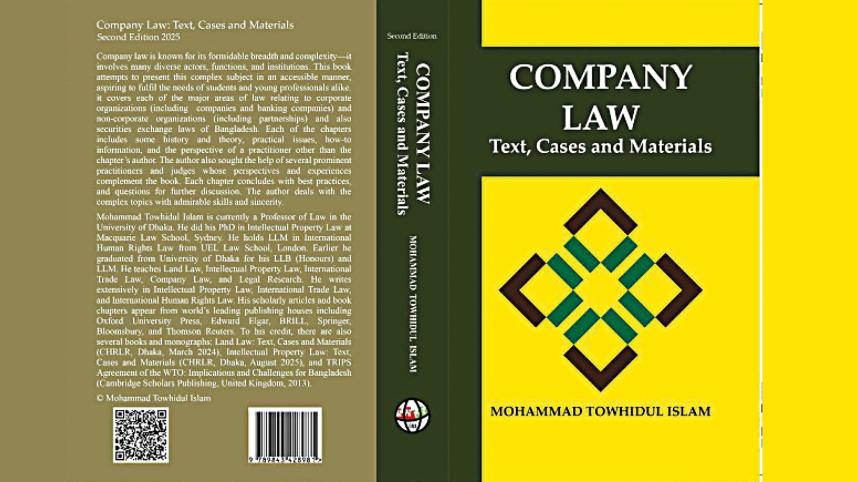Reflections on ‘Company Law: Text, Cases and Materials’

Few areas of law are as labyrinthine as Company Law, where intricate rules on formation, governance, and finance demand both precision and insight. A sound understanding of the discipline, therefore, requires a thorough grasp of its evolving jurisprudence, ranging from a web of rules contained in the statutes, case laws from domestic and overseas courts, and its foundational principles.
In this context, Professor Mohammad Towhidul Islam, PhD, masterfully renders the complexities and expansive scope of Company Law both clear and accessible in his book, 'Company Law: Text, Cases and Materials'. While charting the lifespan of a company – from its formation to dissolution – the book aptly integrates the relevant primary legislation (Companies Act, 1994), secondary legislation (Companies Rules, 2009), and notifications issued by the BSEC. The laws form the basis of the author's analysis, while relevant cases, from both domestic and overseas courts, corroborate and expand upon it.
This work distinguishes itself from conventional Company Law texts by traversing four interrelated but distinct fields – Company Law, Partnership Law, Banking Companies Law, and the Law of Societies. Divided into seven parts, the book comprises a total of twenty-six chapters. The first and second part broadly introduces Company Law to the readers. The third part addresses the formation procedure of companies as of 2025, carefully outlining the obligations of promoters during the pre-formation phase, the requirements of registration and the foundational components of companies – Memorandum and Articles of Association. The fourth part is devoted to corporate governance, analysing the functions of company directors and the procedure for calling and conducting meetings. The fifth part curates the regulation of share capital, debentures and company charges. Concluding the Company Law portion, the sixth part addresses company administration, statutory reporting, amalgamation, and winding up. Finally, the last part sketches the regulatory and legal frameworks of partnerships, banking companies, and societies.
The book's prominence rests on its several noteworthy features. To begin with, the book in several parts differentiates between and sets out the advantages and disadvantages of various kinds of enterprises, such as Joint Venture Company, One Person Company and Partnership, so as to enable readers to determine which structure best suits their needs. Moreover, the text incorporates key theories of Company Law, such as the organic, alter ego, and agency theories, wherever the occasion arises. Moreover, it highlights contemporary developments, such as the UK's reform of the ultra vires doctrine. The book's originality is further marked by its inclusion of underexplored themes such as Corporate Taxation, Corporate Social Responsibility, and Corporate Arbitration. Each chapter concludes with a touch of best practices and questions for further discussions.
By virtue of its breadth and depth, the book has the potential to benefit students and members of both the bar and the bench, providing, within one volume, a unified resource that spares readers from resorting to fragmented notifications and dispersed rules. Corporate lawyers, academics, regulators, and policy-makers are also likely to benefit from its comprehensive treatment of Company Law.
To conclude, 'Company Law: Text, Cases and Materials' marks a milestone as a seminal contribution to Bangladeshi corporate legal scholarship. The penmanship of the author instils the readers with confidence in the book's ongoing refinement in future editions.
The writer studies law at the University of Dhaka.
 For all latest news, follow The Daily Star's Google News channel.
For all latest news, follow The Daily Star's Google News channel.
Comments